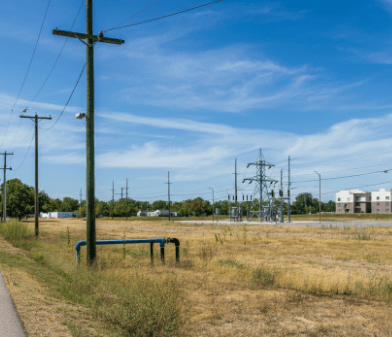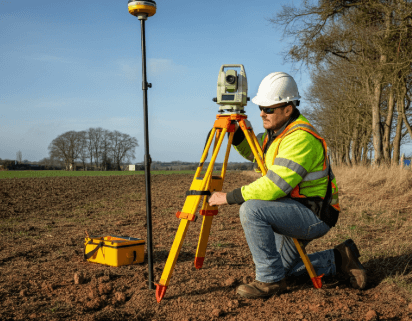Finding the perfect piece of land is the beginning of planning a successful real estate venture. However, an equally important consideration is ensuring that essential services like water, electricity, and sewage are readily available. If you’re asking, “How do I know if there are utilities to land in Bonita Springs?” you’re not alone. This bustling Southwest Florida locale offers numerous opportunities for potential buyers, but verifying utility access can be critical in your decision-making process. Read on as we guide you on “How do I know if there are utilities to land in Bonita Springs?” and help navigate the steps necessary to confirm utility availability and ensure a hassle-free land acquisition experience.
Seasoned real estate investors Steve Daria and Joleigh highlight the crucial importance of thoroughly researching utility availability before purchasing land in Bonita Springs, Florida. Their expertise highlights checking with local utility companies and reviewing the property’s public records as essential to ensuring a well-connected property. By following these investor tips, potential buyers can make informed decisions and avoid future complications.
Why Knowing Utilities Access Matters
Utility access is a fundamental aspect of land development.
It affects not only the feasibility but also the cost and timeline of your project.
Inadequate utilities can lead to significant additional expenses and delays.

What Are Utilities?
Before we dig deeper, let’s clarify what we mean by “utilities.”
Utilities usually include water, sewage, electricity, gas, and internet services.
Each of these is essential for making any land suitable for residential or commercial use.
Basic Utilities You Need to Check
When determining if a piece of land has utility access, you should generally look for the following:
- Water Supply: Ensure a municipal water supply or a viable well option.
- Sewage: Check for a connection to the city sewer system or the feasibility of a septic system.
- Electricity: Confirm that electrical lines run close to or directly to the property.
- Gas: Determine if natural gas lines are available or if you need alternatives like propane.
- Internet and Cable: Ensure high-speed internet and cable services can be installed on the property.
Get Started: Get Your Cash Offer Below…
We are direct land buyers. There are no commissions or fees and no obligation whatsoever. Start below by sharing where your property is and where we can send your offer…
Steps to Determine Utility Access in Bonita Springs, Florida
How do I know if there are utilities to land in Bonita Springs? Here’s how:
Contact Local Utility Providers
The first and most straightforward step is to contact local utility providers directly.
They will have records on file that indicate which properties have access to their services. Here’s how you can get started:
- Water and Sewage: Contact Bonita Springs Utilities (BSU) to determine water and sewage availability. They can confirm if there’s an existing line or if an extension is necessary.
- Electricity: Reach out to Florida Power & Light (FPL) to ascertain electricity service availability and any infrastructure needing upgrading.
- Gas: Contact local natural gas providers to check on the presence of gas lines or explore alternatives such as propane suppliers.
- Internet and Cable: Providers such as Comcast, Xfinity, and CenturyLink can inform you about available packages and infrastructure requirements.
Check Local Government Records
Another vital resource is local government records.
The city planning department and zoning office will provide details about utility access in specific areas.
These records help you understand zoning restrictions or future infrastructure projects affecting your utilities.
Visit the Site
After gathering preliminary information, make a site visit.
On-site evaluations can reveal important details like utility poles, water meters, and gas line markers that are not always evident in maps or records.
Consult a Professional
If there’s any uncertainty, consider hiring a professional such as a civil engineer or a surveyor.
These experts can conduct thorough assessments to ensure your planned development meets all utility requirements, thus mitigating risks effectively.
Use Online Tools and Maps
Many local governments and utility companies offer online tools and maps showing utilities’ availability.
These resources can save you time and visually represent existing utility lines.
Understanding Zoning Laws and Regulations
Zoning laws can significantly influence utility access. Knowing the zoning classification of your land can give you insights into what utilities are typically available in that area.
- Check with the Zoning Office: Contact the Bonita Springs zoning office to learn the zoning rules for your land, including utilities and restrictions.
- Review Land Development Codes: Land development codes offer details on utility requirements and are accessible online or at local government offices.
The Role of Surveys and Inspections
Professional surveys and inspections can offer a comprehensive view of utility access. These professionals can identify existing utility lines and any issues impacting your project.
- Hire a Professional Surveyor: A licensed surveyor can perform a detailed land survey, showing all existing utilities and any potential barriers to connecting new utilities.
- Conduct Environmental and Soil Tests: These tests can reveal utility installation issues, such as poor soil conditions or environmental restrictions.

Cost Considerations for Utility Installation
Understanding the costs associated with utility installation is crucial for budgeting your project. Different utilities will have different costs based on distance to existing lines and other factors.
- Get Quotes from Utility Providers: Contact utility providers for quotes on extending services to your land. This will give you a clear idea of the costs involved.
- Consider Long-Term Costs: Beyond initial installation, consider the long-term costs of utility services. This includes monthly bills and maintenance fees.
Tips for Negotiating with Utility Providers
Negotiating with utility providers can reduce costs or speed up the process. Here are some tips:
- Be Prepared: Have all necessary documents and information readily available.
- Ask About Discounts: Certain providers offer discounts for new projects or large-scale installations.
- Seek Multiple Quotes: Avoid settling for the initial quote you receive; instead, compare rates from various providers.
Common Challenges and How to Overcome Them
Even with preparation, you may encounter challenges when ensuring utility access to your land. Some common obstacles include:
- Distance from Utility Lines: Land further from utility lines incurs higher costs; partnering with neighbors can help share installation expenses.
- Regulatory Hurdles: Collaborating with local government and staying updated on regulations can prevent delays in utility installation.
- Environmental Concerns: Environmental restrictions can impact utility installation, so early assessments are crucial for effective planning.
Leveraging Technology for Utility Checks
In today’s digital age, technology offers numerous tools that simplify checking utility access. Here are some:
- Geographic Information Systems (GIS): GIS technology offers detailed utility maps and data, with many local governments providing online access to these services.
- Mobile Apps: Mobile apps assist in locating utilities and managing land development projects, offering features like mapping, project management, and cost estimation.
Conclusion
Determining “How do I know if there are utilities to land in Bonita Springs, Florida?” requires a thorough approach involving key steps such as contacting local utility providers and utilizing online tools and maps for precise details. Engaging with the local zoning office is essential to understanding zoning laws that may affect utility access fully and considering professional surveys for accurate assessment. Taking these measures allows you to navigate potential challenges effectively and ensure that your land development projects proceed smoothly.
**NOTICE: Please note that the content presented in this post is intended solely for informational and educational purposes. It should not be construed as legal or financial advice or relied upon as a replacement for consultation with a qualified attorney or CPA. For specific guidance on legal or financial matters, readers are encouraged to seek professional assistance from an attorney, CPA, or other appropriate professional regarding the subject matter.
